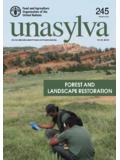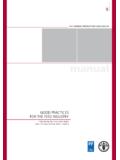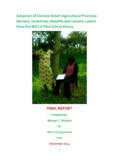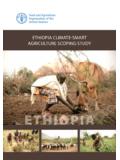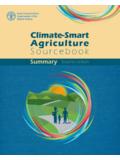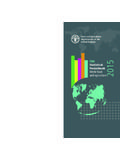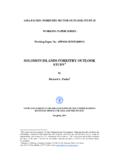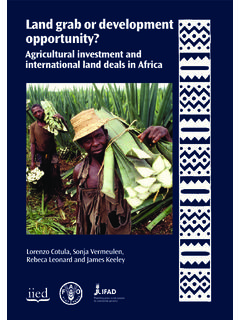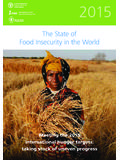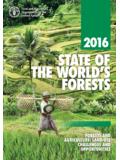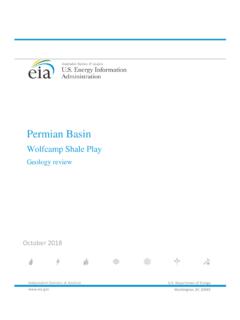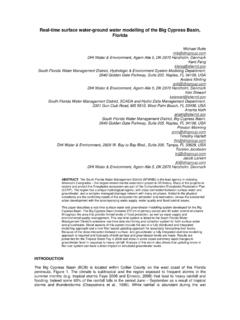Transcription of Understanding Farmers' Perceptions and Adaptations to ...
1 IFPRI Discussion Paper 00849. February 2009. Understanding farmers ' Perceptions and Adaptations to Climate Change and Variability The Case of the Limpopo basin , south Africa Glwadys Aymone Gbetibouo Environment and Production Technology Division INTERNATIONAL FOOD POLICY RESEARCH INSTITUTE. The International Food Policy Research Institute (IFPRI) was established in 1975. IFPRI is one of 15. agricultural research centers that receive principal funding from governments, private foundations, and international and regional organizations, most of which are members of the Consultative Group on International Agricultural Research (CGIAR).
2 FINANCIAL CONTRIBUTORS AND PARTNERS. IFPRI's research, capacity strengthening, and communications work is made possible by its financial contributors and partners. IFPRI receives its principal funding from governments, private foundations, and international and regional organizations, most of which are members of the Consultative Group on International Agricultural Research (CGIAR). IFPRI gratefully acknowledges the generous unrestricted funding from Australia, Canada, China, Finland, France, Germany, India, Ireland, Italy, Japan, Netherlands, Norway, south Africa, Sweden, Switzerland, United Kingdom, United States, and World Bank.
3 AUTHOR. Glwadys Aymone Gbetibouo, Centre for Environmental Economics and Policy in Africa Department of Agricultural Economics, University of Pretoria or Notices 1. Effective January 2007, the Discussion Paper series within each division and the Director General's Office of IFPRI. were merged into one IFPRI wide Discussion Paper series. The new series begins with number 00689, reflecting the prior publication of 688 discussion papers within the dispersed series. The earlier series are available on IFPRI's website at #dp. 2. IFPRI Discussion Papers contain preliminary material and research results. They have not been subject to formal external reviews managed by IFPRI's Publications Review Committee but have been reviewed by at least one internal and/or external reviewer.
4 They are circulated in order to stimulate discussion and critical comment. Copyright 2009 International Food Policy Research Institute. All rights reserved. Sections of this material may be reproduced for personal and not-for-profit use without the express written permission of but with acknowledgment to IFPRI. To reproduce the material contained herein for profit or commercial use requires express written permission. To obtain permission, contact the Communications Division at Contents Acknowledgments v Abstract vi Abbreviations and Acronyms vii 1. Introduction 1 2. adaptation to Climate Change: A Theoretical Perspective 2 3.
5 The Study Area: Limpopo River basin in south Africa 4 4. The Data 6 5. Assessing farmers ' Perceptions to Climate Change and Variability 7 6. Modeling farmers ' adaptation Options to Climate Change and Variability 15 7. Conclusions and Policy Implications 28 Appendix A: Questionnaire on Climate Change and adaptation Options 29 Appendix B: Supplementary Tables 30 References 37 iii List of Tables 1. Limpopo basin areas 4 2. Perception of changes in temperature at provincial level (%) 8 3. Analysis of temperature data from 1960 to 2003 9 4. Perceptions of changes in rainfall (%) 10 5. Analysis of the rainfall data from 1960 to 2003 11 6.
6 Moran's I Test for spatial correlation of climate change perception 13 7. Results of the seemingly unrelated biprobit model of farmers ' perception of change in the climate, Limpopo River basin 14 8. Barriers to adaptation in the Limpopo River basin (% of the respondents) 15 9. Adaptations options in response to change in temperature (% of respondents) 16 10. Adaptations in Response to Changes in Rainfall (% of respondents) 16 11. Variables hypothesized to affect adaptation decisions by farmers in the Limpopo River basin 22 12. Results of the Heckman probit model of Adaptations behavior in the Limpopo River basin 24 13.
7 Results marginal effects of the MNL adaptation model, Limpopo River basin 27 Perceptions of changes in temperature by farmer experience (%) 30 Perceptions of changes in rainfall by farmer experience (%) 30 Perceptions of changes in temperature by farmer education level (%) 30 Correlation matrix of the independent variables of the adaptation model 31 Summary statistics of the variables for the adaptation model 33 Results of the multinomial logit adaptation model, Limpopo River basin 35. List of Figures 1. Provinces and WMAs in the Limpopo River basin area 5 2. farmers ' Perceptions of changes in temperature in the Limpopo River basin 7 3.
8 Trend of temperature data for the Limpopo River basin : 1960 2003 8 4. farmers ' Perceptions of changes in precipitation in the Limpopo River basin 10 5. Limpopo River basin rainfall trend (1960-2003) 12 iv ACKNOWLEDGMENTS. This work is supported by the Federal Ministry for Economic Cooperation and Development, Germany, under the project Food and Water Security under Global Change: Developing Adaptive Capacity with a Focus on Rural Africa, which forms part of the CGIAR Challenge Program on Water and Food. Support has also been received under the IFPRI DGO Small Grants Initiative Program. The author would like to thank Kato Edwards and Claudia Ringler for their helpful comments and directions on earlier versions of the paper.
9 Special thanks go to Elizabeth Bryan and Wisdom Akpalu for their assistance on numerous technical points. v ABSTRACT. Climate change is expected to have serious environmental, economic, and social impacts on south Africa. In particular, rural farmers , whose livelihoods depend on the use of natural resources, are likely to bear the brunt of adverse impacts. The extent to which these impacts are felt depends in large part on the extent of adaptation in response to climate change. This research uses a bottom-up approach, which seeks to gain insights from the farmers themselves based on a farm household survey. Farm-level data were collected from 794 households in the Limpopo River basin of south Africa for the farming season 2004.
10 2005. The study examines how farmer Perceptions correspond with climate data recorded at meteorological stations in the Limpopo River basin and analyzes farmers ' adaptation responses to climate change and variability. A Heckman probit model and a multinomial logit (MNL) model are used to examine the determinants of adaptation to climate change and variability. The statistical analysis of the climate data shows that temperature has increased over the years. Rainfall is characterized by large interannual variability, with the previous three years being very dry. Indeed, the analysis shows that farmers ' Perceptions of climate change are in line with the climatic data records.
